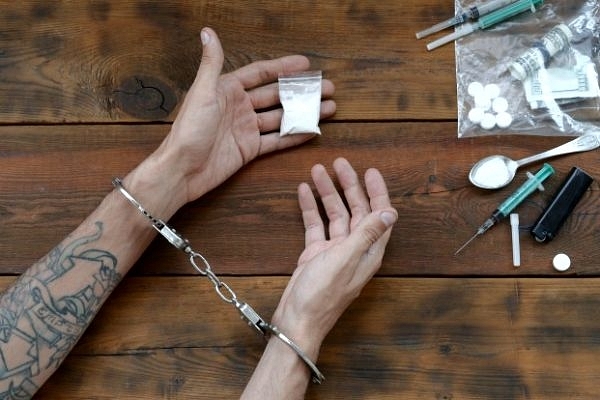News Brief
Explained: The NDPS Act—Where The Accused Is Guilty Until Proven Innocent
- Here's a brief explainer of Narcotic Drugs and Psychotropic Substances (NDPS) Act, it's provisions and shortcomings.

Narcotic Drugs And Psychotropic Substances Act (Representative image/freepik)
Several recent events such as the arrest of Aryan Khan and seizure of the largest consignment of drugs in Mundra port have brought the Narcotic Drugs and Psychotropic Substances (NDPS) Act into the limelight.
The NDPS act is the main legislation in India regulating and controlling the possession, use, manufacture, financing, transporting, etc. of drugs and psychotropic substances.
Narcotic Drugs and Psychotropic Substances (NDPS) Act
The law was enacted in 1985 and has been amended three times since its enactment. The most recent amendment was made in 2014.
It was enacted to fulfil India’s obligations under three international treaties aimed at tackling the menace of drug trafficking. The treaties are - Single Convention on Narcotic Drugs (1961), Convention on Psychotropic Substances (1971), and the United Nations Convention Against Illicit Traffic in Narcotic Drugs and Psychotropic Substances (1988).
The law defines narcotic drugs as coca leaf, cannabis (hemp), opium, poppy straw and includes all manufactured drugs.
Psychotropic substances are defined as any substance, natural or synthetic, or any natural material or any salt or preparation of such substance or material included in the list of psychotropic substances specified in the Schedule of the act.
Main Provisions of the Act
The law makes provisions for prevention and combating abuse of drugs and banning illicit traffic in narcotic drugs. It prohibits, controls and regulates the cultivation, manufacture, possession, sale, export and import of narcotic drugs.
It defines various offences related to possession or conducting any activities related to drugs and assigns penalties to them.
It also sets the procedure for government agencies to investigate, seize and arrest suspected matter and people.
The law creates a fund for control of drug abuse which would be used for combating illicit drug trafficking, preventing drug abuse, controlling abuse of drugs and psychotropic substances and educating the public against drug usage among others.
The law also makes provisions for setting up a central agency for carrying out the provisions of the law. Accordingly, the Narcotics Control Bureau (NCB) was established in pursuance of this provision in 1986.
Offences
The law demarcates several offences which include possession, consumption, financing, manufacturing, sale, transport, import or export of various drugs and psychotropic substances. It also criminalises allowing using one’s premises to conduct any of the above offences.
Penalties
The law assigns different penalties for dealing with quantities of different drugs. It classifies quantities as “small” and “commercial”. Each drug has been assigned different amounts for small and commercial.
For example, for cocaine, small quantity is 2 grams and commercial quantity is 100 grams. For heroin, small quantity is 5 grams and commercial quantity is 250 grams.
Penalties for offences increase in a graded manner as per increasing quantities of drugs. It also penalises attempts to commit any offence under this law.
For repeat offences, the law enhances the penalties. Certain offences also attract death penalties for repeat conviction. This includes financing the sale, possession of drugs and dealing in commercial quantities of drugs.
All of the offences are cognisable (authorities can arrest without warrant) and non-bailable. Bail for certain offences can be awarded only after the public prosecutor has been given the opportunity to oppose the bail and if the court is satisfied that the accused is not guilty and he is not likely to commit the offence while on bail.
Sentences awarded under this law cannot be suspended, commuted or remitted other than offences for consumption of drugs or narcotic substances.
For prosecution under this law, the accused is assumed to be guilty unless the opposite is proved.
Shortcomings of the law
The law has been criticised for not differentiating between casual consumers of drugs, first-time users, drug peddlers or drug addicts for consumption of a drug or psychotropic substance under Section 27 of the act. As per news reports, the Ministry of Social Justice and Empowerment is looking to decriminalise possession of small quantities of drugs.
The law has also been criticised for the presumption of guilt of the accused, which goes against the International Covenant on Civil and Political Rights according to which presumption of innocence is a human right.
State of Drug and Substance Abuse in India
As per the report “Magnitude of Substance Abuse in India” by the Ministry of Social Justice and Empowerment, the consumption of cannabis and opioids had been reported by about 2.8 per cent of the population or 31 million individuals in absolute numbers.
Nasha Mukt Bharat Abhiyaan
Nasha Mukt Bharat campaign was launched against substance abuse by the union government in 2020. The campaign focuses on 272 most affected districts. The components of the campaign include awareness programmes, treatment facilities and capacity building among others.
Support Swarajya's 50 Ground Reports Project & Sponsor A Story
Every general election Swarajya does a 50 ground reports project.
Aimed only at serious readers and those who appreciate the nuances of political undercurrents, the project provides a sense of India's electoral landscape. As you know, these reports are produced after considerable investment of travel, time and effort on the ground.
This time too we've kicked off the project in style and have covered over 30 constituencies already. If you're someone who appreciates such work and have enjoyed our coverage please consider sponsoring a ground report for just Rs 2999 to Rs 19,999 - it goes a long way in helping us produce more quality reportage.
You can also back this project by becoming a subscriber for as little as Rs 999 - so do click on this links and choose a plan that suits you and back us.
Click below to contribute.
Latest